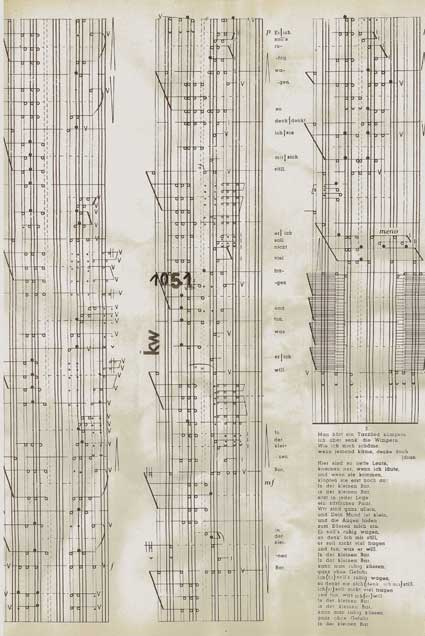 |
Title
 Я любил целовать женщин
Я любил целовать женщин Gern Hab' Ich Die Frau'n Geküsst
Gern Hab' Ich Die Frau'n Geküsst J'aimais Embrasser Les Femmes
J'aimais Embrasser Les Femmes  I Enjoyed Kissing Women
I Enjoyed Kissing WomenOrigin
Subject
| on the background the score of the operetta "paganini" (1925) of the austrian composer franz lehár (1870-1948). on this score is stick down a woman and a dressed boy on the right side. the woman has the "eyes of a filmstar" ("filmstaraugen") and her hands are opended in the direction of her skirt. instead of her breast are stick down two big ballons. above and beneeth the arm of the woman the text of the operetta "paganini": "gern hab' ich die frau'n geküsst": "nimm sie dir, küss sie nur, dazu sind sie ja hier! ... doch treu bin ich nicht sehr," ("with pleasure i have kissed the women": "take them, kiss them, that is why they are here! ... but i am not very abiding,"). on the backside: the same score with another song. this song is about a couple which is huging auricularly in small bars. paroles de "gern hab' ich die frau'n geküsst" lehar / knopler / jenbach / welleminsky ich kenn der wahrhaften sünde glut / i know the the real glow of the sin weiß auch, wie weh oft die falschheit tut / i also know how much the falseness aches ich denk mit lachen und weinen zurück / i think back while laughing and crying und such im rausche, im tausche das glück / i am lookin for luck in the flush and change refrain (x2) gern hab ich die frau'n geküßt / with pleasure i kissed the women hab nie gefragt / i never asked ob es gestattet ist / if it is allowed dachte mir / i thought nimm sie dir / take them küss sie nur / just kiss them dazu sind sie ja hier / that is why they are here nie nahm ich die liebe schwer / i never took the love seriouse ich küßte heiß / i kissed hot doch treu war ich nie sehr / but i am not very abiding kam als mann / as a man stehts gut an / i always succeeded und drum hielt auch keine allzu lang / and that is why i never stayed long with one woman refrain |
Description
| sur fond d'une partie de partition de l'opérette "paganini" (1925) du compositeur autrichien franz lehár (1870-1948) sont collés une femme et un garçon. la femme aux "yeux de vedettes de cinéma" ("filmstaraugen") se présente, les mains vers la jupe, avec deux grands ballons à la place de la poitrine. un petit garçon en costume, pris en plongée, est à sa droite. au dessus et en dessous du bras de la femme on peut lire des parties de la chanson populaire de l'operette paganini "gern hab' ich die frau'n geküsst": "nimm sie dir, küss sie nur, dazu sind sie ja hier! ... doch treu bin ich nicht sehr," ("prends-les, embrasse-les, elle sont faites pour! ... mais je ne suis pas très fidèle"). backside: dos de la même page de partition avec la musique d'une autre chanson traitant des couples qui s'embrassent en cachette dans les petits bars. paroles de "gern hab' ich die frau'n geküsst" lehar / knopler / jenbach / welleminsky ich kenn der wahrhaften sünde glut / je connais la braise du vrai pêché weiß auch, wie weh oft die falschheit tut / je sais aussi à quel point la hypocrisie fait souvent mal ich denk mit lachen und weinen zurück / j'y repense avec un sourire et une larme und such im rausche, im tausche das glück / je cherche le bonheur dans le délire, dans l'échange refrain (x2) gern hab ich die frau'n geküßt / j'aimais embrasser les femmes hab nie gefragt / je n'ai jamais demandé ob es gestattet ist / si c'est permis dachte mir / je me disais nimm sie dir / prends-les küss sie nur / embrasses-les dazu sind sie ja hier / elles sont faites pour! nie nahm ich die liebe schwer / jamais je ne prenais l'amour lourdement ich küßte heiß / j'embassais chaudement doch treu war ich nie sehr / mais je n'étais jamais très fidèle kam als mann / j'avais comme homme stehts gut an / toujours du succès und drum hielt auch keine allzu lang / et par conséquent aucune ne tenait jamais très longtemps. refrain |
Au verso de l’oeuvre

You want to make your contribution on the understanding of this work ?
(subject, political reference, history, recognition of a character, etc...)